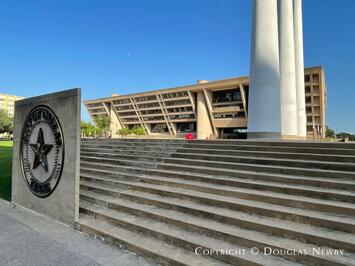
The rise of the city manager form of government during the first progressive era was welcomed as a significant reform and improvement over the often corrupt ward system that dominated beforehand. When adopted in 1931, Dallas saw in the city manager as a sign of modernization, an aspirational ideal for an emerging city. It seemed to prevent a Chicago Mayor style form of ward system government, creating a political machine ripe for corruption. This reflected the progressive view that cities, like society, should be run not by elected politicians but “neutral” professionals. Yet increasingly this system no longer functions as well and has eroded the democratic hold on City Hall.
Chicago Can Vote Out Mayor
Chicago citizens can at least vote out a mayor for corruption or inefficiency. Dallas voters do not have that luxury to vote out a City Manager --- who basically runs the city --- for incompetency or inefficiency. This is unfair to the neighborhoods who represent 14 single member districts. It also matters now because the City Manager proposes the budget, spends the money, and even hires the Chief of Police, in effect dictating policy.
Dallas City Manager Cannot be Fired by City Council Majority
The Dallas City Charter specifies that it takes a super majority of the City Council to remove a City Manager if he does a bad job or is not responsive. This means the City Manager only needs the support of six City Council persons to retain his $436,000/year job. The combination of the City Manager setting the budget and spending the money, and the almost total control that the City Councilpersons have over their respective districts, can breed an unholy alliance between six compliant City Councilpersons and the City Manager. For instance, if hypothetically a developer seeks a favor from a City Councilperson to get permission to build a low-income tax credit or subsidized apartment development, Councilperson can seek a favor from the City Manager to approve this development in return for protecting the City Manager’s job.
Dallas City Manager Has Too Much Control Over Low-Income Housing
I give low-income housing as an example of potential trouble, because that is the area that has landed the greatest number of Dallas City Councilpersons in prison over the last two decades. It is also currently the most contentious issue in southern Dallas. Citizens of City Council District 3, which is made up predominately of minority residents and led by Black architect and retired city planner Darryl Baker, have filed a formal complaint to HUD claiming harm to southern Dallas homeowners, due to the many instances when the City of Dallas dumped low and mixed-income apartments into their neighborhoods. The Dallas Mayor and the City Councilpersons outside of southern Dallas have little or no say in this ongoing proliferation of subsidized new low and mixed-income apartment developments in southern Dallas, because each district is controlled by its City Councilperson and the City Manager. As long as developer subsidized low and mixed-income apartments are dumped into lower income minority neighborhoods, there is little chance for those neighborhoods to attract single-family homes and quality development that would raise the tax revenue for the entire city.
Single Member Districts Segregate Dallas and Create Ward System Under City Manager Form of Government
The old and now tired argument in cities is that single member districts give a greater voice to minority voters. This is simply not true. The residents in a City Council district have far more influence if they have more than one City Council member to represent their interest. Now, if a sole City Council member decides for whatever reason to put a warehouse or multifamily development next to a single-family home neighborhood, the residents of that neighborhood have no other elected representative to plead their case. The result is political supporters and favored developers can get whatever zoning they want and the concerns of the residents are often ignored.
At-Large City Council Districts Give Voters More Opportunity to Vote for a Minority
In 1990, on the eve of the Dallas referendum on the 14-1 single member district plan (one at-large elected mayor), I wrote an op-ed explaining how single member districts would resegregate the city. Contrary to popular belief, at-large districts gave more voters an opportunity to vote for a minority candidate for office, and white voters were open and eager to do so. In fact, two of Dallas’ at-large elected mayors have been black. While white City Councilpersons have been elected in minority districts, a minority has never been elected to a majority white district. The more anticipated problem of single member districts creating a ward system also proved true. City Council courtesy that is extended on almost every zoning or other issue pertaining to a specific district often means that no City Councilperson could effectively pursue the best interest of the entire city which leaves city-wide decisions largely in the hands of the city manager.
Why City Manager Form of Government is No Longer Effective
Our current mayor, Eric Johnson, a brilliant and insightful mayor generally interested in benefitting every citizen of Dallas has been a strong advocate of increasing the budget for funding the police, lowering the tax rate, eliminating burdensome delays in the building permit process, creating a pathway for better jobs for low-income workers, and promoting homeownership that creates generational wealth for minorities, rather than artificially integrating white neighborhoods with subsidized apartments. I am frustrated that the mayor cannot do more to push these ideas further forward.
City Manager Defies Mayor and City Council on Streamlining Permits
The best example of the City Manager hindering the priorities of the Mayor and City Council is the delay in fixing the permitting process. The long, cumbersome permit approval delays are not of west coast proportions, but Dallas lags its surrounding cities in building permit efficiencies. Since the Mayor has taken office, he, the City Council, business groups and civic leaders have prodded the City Manager to solve the problems and make the building permit process smoother and faster. Recently, the City Manager, in effect, said to the Mayor and City Council that obtaining a building permit is just a perception problem and he did not provide a solution to solve this problem. An upcoming vote is pending to remove the City Manager. However, the City Manager should not have so much power, that he can defiantly refuse to pursue the priorities of the mayor and City Council who are technically responsible for the direction of the city.
City Manager in Ward System Can Ignore Mayor
The second reason for my change in thinking about a City Manager form of government is the public attitude of the current City Manager T.C. Broadnax. In the past, the Dallas City Manager, regardless of the amount of power he or she wielded, publicly was very respectful of the Dallas Mayor. When we still had some at-large members of the City Council, the legendary Mayor Robert Folsom and City Manager George Shrader worked together to create fantastic projects for Dallas including Bryan Place, (the first inner-city single-family home development in decades. This is in contrast to the lack of cooperation between the current City Manager and the Mayor and City Council.
City Manager is Hindering Progress on Dallas Priorities
Currently, the Dallas City Manager appears to be hindering progress on the priorities of the mayor. Some mayoral priorities have been sidelined; others have been dismissed. He is widely reported to be displeased that there was any objection to how the Dallas building permit process has been handled. In remarks to business and civic groups, the City Manager has openly ridiculed the Dallas mayor for his high profile and his prolific emails and tweets – in which the mayor informed the public on issues facing Dallas and steps being taken. This year, when the City Manager addressed a prominent group of business and civic leaders where I was in attendance, I was shocked by his tone and gratuitous disrespect of the Mayor. It is hard to recall a high-profile employee of any organization who has been so blatantly dismissive of their boss as Broadnax has been of Mayor Johnson. Even though the City Manager makes four times as high a salary as the mayor, technically the mayor is still the City Manager’s boss. In reality, in our current form of City Manager ward system form of government, the City Manager does not have a boss, just an alliance with six City Councilmembers that protect his position.
Dallas Needs to Make Two Changes to City Charter to Reform City Manager Form of Government
Dallas urgently needs to make two changes to its City Charter to maintain its position as the most successful city in the nation. It needs to reconfigure the City Council so that at least a few of the City Council positions are elected at-large, to give Dallas citizens the opportunity to be represented by more than one person controlling a City Council District fiefdom. It also needs to change the City Manager form of government to a mayoral form of government, or at least allow the Mayor to propose the budget and hire the Chief of Police.
Like other cities, Dallas, even though in a fast-growing region, is falling behind, even losing population the last two years. The current system no longer works in the city’s favor. Managerialism has clearly failed. Maybe democracy will work better.

American Flag, Texas Flag, Dallas Flag at Dallas City Hall
Douglas Newby is a national award-wining real estate broker who writes about real estate, cities, architecture and Organic Urbansim. He gave the TEDx Talk Homes That Make Us Happy. You can read more about him and his work on his website Architecturally SignificantHomes: DougNewby.com and on his blog DouglasNewby.com.
Lead photo: Modern architect I.M. Pei designed Dallas City Hall. Dallas is also known for national, international, and Dallas architects designing modern homes in Dallas neighborhoods that need to be protected from short-term rentals.












